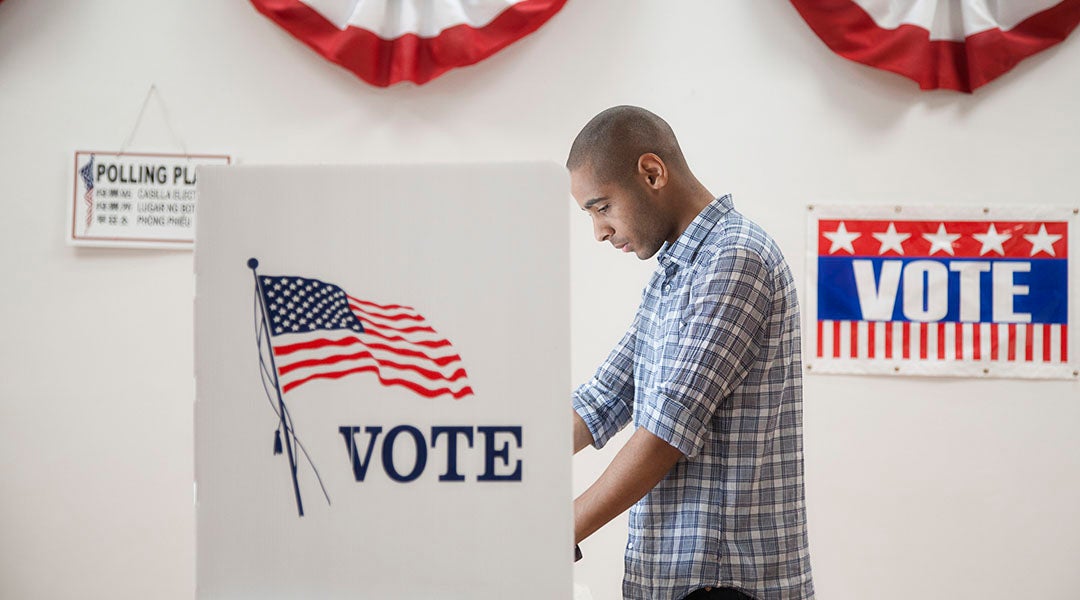Stress Management During Heated Election
October 27, 2020
Stress Management During Heated Election
With just a few days remaining before we head to the voting polls, research indicates there are high levels of anxiety and feelings of uncertainty among Americans. It is vital to make yourself a priority with both mental and physical health. According to a Pew Research Center survey of U.S. adults, taken back in July, some 55% of adult social media users say they feel “worn out” by how many political posts and discussions they see on social media. The 2020 Presidential Election, coupled with the nation’s pandemic fatigue, means it’s a fitting time to rethink, and reset, how we take in and process election information.

What you CAN'T control:
- Remember you cannot control other people's opinions, beliefs, reactions, or how they choose to express those things.
What you CAN control:
- The coverage you follow.
- Be mindful of the amount of time you spend watching and reading about the candidates and election. While we are used to the 24-hour news cycle, especially with social media, you can control, and limit if needed, how much time you are personally dedicating to these platforms.
- If you find yourself constantly frustrated or upset by the media you follow, take a break from those outlets. Make it a priority for yourself to consciously avoid reading comments or responses that you know will cause frustration. It may even be helpful to delete social media channels from your smartphone, if that is where you access them most often. By limiting your access, you are also limiting the level of stress you ultimately cause yourself because of instant availability.
- How you interact, both in-person and online.
- While healthy debates and informational conversations regarding the election are a valuable part of the decision-making process, try limiting stress inducing interactions. Be mindful of how your interactions are affecting you, and those around you. While it may be tempting to argue, especially on social media, realize that an online argument often ends with frustration and increased stress on the participants.
- Your response.
- Try to channel your concerns into making a positive difference on issues you care about. Whether that means volunteering for your preferred candidate or getting involved in your community by joining a local group, focus your energy on positive interactions with like-minded people, versus negative responses to those who disagree with your views.
- Coping; How you deal with stress.
- Make sure you are taking time to support your own mental health, in whatever healthy way works best for you. Exercise, meditation, cooking, getting outside, participating in your favorite hobbies, etc. Prioritize yourself by getting enough sleep, eating well, and avoiding negative coping strategies such as drugs or alcohol.
- Practice gratitude.
- Look at all areas of your life and find things to be thankful for, no matter how big or small. Even, and especially in the hard times, it is important to appreciate the good. Take a couple of minutes each day, perhaps in the morning as you wake up or at night as you’re going to bed and think about a couple of positive things you can be grateful for.
- Be proactive.
- Put on your mask and vote! As Americans, we have the privilege to exercise our voice in the most effective way, by casting our ballot.
It is important to have a plan leading up to Election Day to take the necessary precautions to protect yourself and your health, while also participating in democracy.
- Vote early if you can.
- The Centers for Disease Control and Prevention (CDC) recommends early voting because it lessens crowds at polling places on Election Day. If you live in a state that does not conduct early voting in person, such as Connecticut, and you plan on visiting the polls on November 3, consider choosing a non-peak time if possible.
- Make initial preparations by confirming your voting location. Many areas are moving their standard polling locations to larger venues that are more conducive to social distancing. If you are voting in person, make sure you know where your community is voting so that you are not scrambling at the last moment.
- In Connecticut, visit https://portaldir.ct.gov/sots/LookUp.aspx to find your polling location.
- In Massachusetts, visit https://www.sec.state.ma.us/wheredoivotema/bal/myelectioninfo.aspx and enter the required information to see your polling location and sample ballot.
- You can also prepare for voting by reviewing a sample ballot at home prior to heading to your voting location. This will allow you to know what to expect when you are handed your ballot and you don’t have to spend more time inside the polling location than is necessary.
- In Connecticut, visit https://portal.ct.gov/SOTS/Election-Services/Town-Ballots/2020-Town-Ballots and choose your town to see your ballot.
- In Massachusetts, visit https://www.sec.state.ma.us/wheredoivotema/bal/myelectioninfo.aspx and enter your information to see your sample ballot.
- Take precautions.
- If you are voting in person, come prepared to social distance from other voters and wear a mask! Because of predictions of increased numbers in 2020, also be ready for the possibility of waiting longer than normal. Check the weather before you head to your polling location, so you can be prepared if it is cold or raining and you are required to wait outside.
While many people are seeing increased stress levels in multiple areas of their lives this election season, remember that you are not alone! Make your health – both physical and mental – a priority, try to stay positive, and take the necessary steps to keep yourself safe and healthy, while also participating and making a difference.
